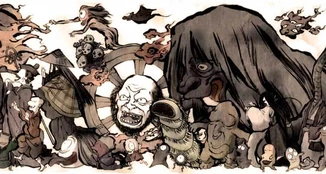
Yokai are one of the main class of supernatural monsters, spirits and demons from Japanese folklore, considered to be one of the three most prominent (alongside the Kami (gods) and Mitami (spirits found within humans and certain Kami but not related to Yokai).
The word 'Yōkai' is made up of the kanji for "bewitching"; "attractive"; "calamity;" and "spectre"; "apparition"; "mystery"; "suspicious".
They can also be called ayakashi (妖), mononoke (物の怪), mamono (魔物) or youma (妖魔). Yōkai range eclectically from the malevolent to the mischievous, or occasionally bring good fortune to those who encounter them.
Types[]
There are a wide variety of yōkai in Japanese folklore. In general, yōkai is a broad term and can be used to encompass, virtually, all monsters and supernatural beings, including creatures from European folklore on occasion (however this is a fairly modern trend and not entirely accurate to the true mythology of the lands).
Animals[]
Many indigenous Japanese animals are thought to have magical qualities. Most of these are henge (変化?), which are shapeshifters that often appear in human form, mostly women. Some of the better known animal yōkai include the following:
- Tanuki (bewitching raccoon dogs)
- Kitsune (bewitching foxes)
- Tsuchinoko (bewitching snakes)
- Mujina (bewitching badgers)
- Bakeneko (bewitching cats)
- Tsuchigumo and jorōgumo (spiders)
- Inugami (divine dogs)
- Kappa (river monsters)
Human transformations[]
There are a large number of yōkai who were originally ordinary human beings, transformed into something horrific and grotesque usually during an extremely emotional state. Women suffering from intense jealousy, for example, were thought to transform into the female oni represented by hannya masks.
Other examples of human transformations or humanoid yōkai are:
- Rokuro-kubi (humans able to elongate their necks during the night)
- Ohaguro-bettari (a figure, usually female, that turns to reveal a face with only a blackened mouth)
- Futakuchi-onna (a woman with a voracious extra mouth on the back of her head)
- Dorotabō (the risen corpse of a farmer, who haunts his abused land)
Other[]
Some yōkai are extremely specific in their habits, for instance:
- Azukiarai (a yōkai who is always found washing azuki beans)
- Akaname (only found in dirty bathrooms and spends its time licking the filth left by the untidy owners)
- Tofu Kozo (a small monk who carries a plate with a block of tofu)
